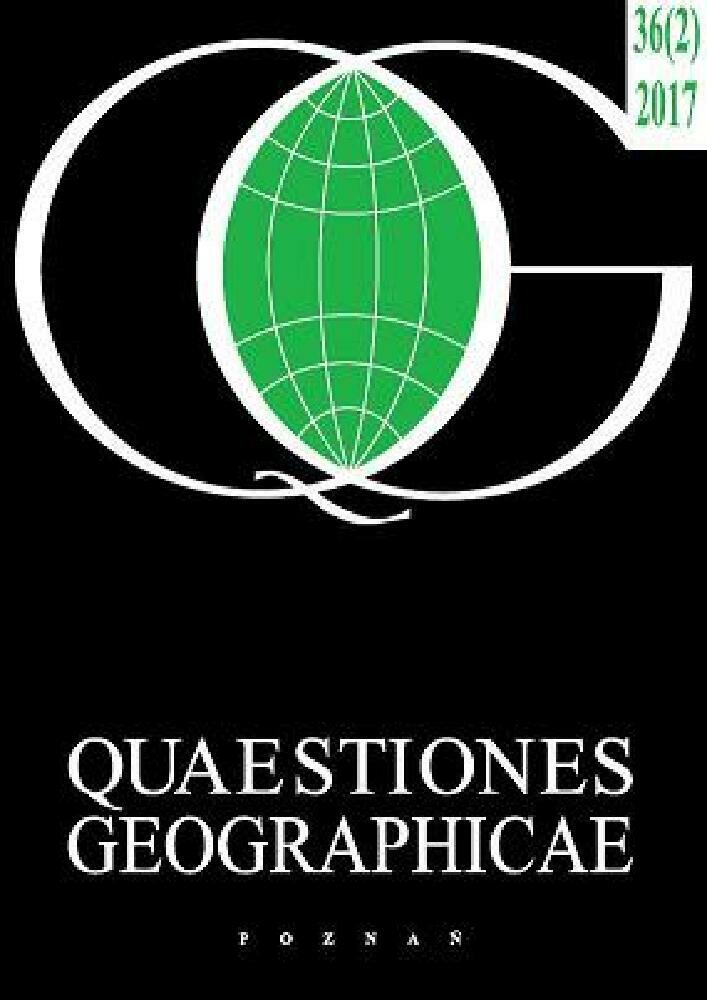Abstract
Organic farming is part of a sustainable development model; at the same time it is becoming a prerequisite for the multifunctional development of rural areas. The main aim of this study is to identify the state and analyse changes in the development of organic agriculture in Poland as well as to present the possibilities for its development. The time horizon of the study covers the years 2003 to 2015. The basis of the research was an analysis of the literature, the Report of the Chief Inspectorate of Trade Quality of Agriculture and Food (IJHARS), and national empirical research; it also includes an analysis of the results of surveys carried out on organic farms in the summer of 2016, as well as our own observations. The study showed that in the years 2003–2015 Poland saw a rapid increase in the number and area of organic farms due in part to the introduction of EU subsidies. Spatial analysis of the proportions of farms by voivodeship shows that in 2015 most were recorded in Warmia Mazuria, Podlasie and West Pomerania. Similar to the increase in the number of organic farms, the years 2003–2015 saw an increased area of organic farmland. Poland is second in the world in terms of growth in the area of organic farms. In the years 2003–2014 the average size of an
organic farm remained at about 25 ha and was higher than the average size of conventional farms (10 ha). In 2014 the crop structure was dominated by fodder plants (35.8%), and meadows and pastures (31.5%). In terms of livestock production, cattle and horses had the biggest share.
References
Christian H., 2008. Determinants of agricultural protection in an international perspective: the role of political institutions. 12th European Congress of Agricultural Economists, Gandawa.
Granstedt A., Tyburski J., 2006. Współczesne europejskie systemy rolnicze (Modern European agricultural systems). Fragmenta Agronomica 2: 72–95.
Grykień S., 2005. Bariery rozwoju rolnictwa ekologicznego w Polsce (Barriers to the development of organic farming in Poland). In: Pałka E. (ed.), Funkcje obszarów wiejskich. Wyd. Akademii Świętokrzyskiej, Kielce.
Hamm U., Gronefeld F., 2004. The European market for organic food. Revised and updated analysis. School of Management and Business, University of Wales, Aberystwyth.
Hirschfeld J., Wessi J., Kornbun T., 2009. Ansiäte einer Klima reundlichen Agroarpolityk. Ökologisch Wirtschafen 1: 15–16.
Jezierska-Thöle A., Biczkowski M., 2013. Znaczenie i uwarunkowania innowacyjności w rolnictwie w Polsce (Importance and determinants of innovation in agriculture in Poland). Roczniki Naukowe Stowarzyszenia Ekonomistów Rolnictwa i Agrobiznesu 15 (2): 124–131.
Jezierska-Thöle A., Janzen J., Rudnicki R., 2014. Agrarian-economic structure of agricultural holdings in Poland and East Germany: Selected elements of comparative analysis. Questiones Geographicae 33(2): 87–101.
Jezierska-Thöle A., Rudnicki R., Kluba M., 2016. Development of energy crops cultivation for biomass production in Poland. Renewable and Sustainable Energy Reviews 62: 534–545.
Koepf H., Plato B., 2001. Die biologisch-dynamische Wirtschaftsweise im 20. Jahrhundert. Die Entwicklungsgeschichte der biologisch-dynamischen Landwirtschaft. Verlag am Goetheanun. Dornach/Schweiz.
Kołodziejczak A., 2015. Wielofunkcyjność rolnictwa jako czynnik rozwoju zrównoważonego obszarów wiejskich w Polsce (Multifunctionality of agriculture as a sustainable development factor of rural areas in Poland). Studia Obszarów Wiejskich 37: 131 142.
Kozłowska 1999. Rolnictwo ekologiczne – czy ma szansę na rozwój? (Organic farming – has it got a chance for development?). Rolnictwo 5: 472.
Kuś J., 2002. Systemy gospodarowania w rolnictwie (Systems of management in agriculture). In: Mały poradnik zarządzania gospodarstwem rolniczym. Mat. szkol. 9, IERiGŻ: 119–126.
Łuczka-Bakuła W., 1997. Ekologizacja rolnictwa a zmiany w świadomości i postawach rolników (Greening of agriculture and changes in the awareness and attitudes of farmers) In: Problemy dydaktyki i wychowania w Akademii Rolniczej w Poznaniu. Wyd. Akademii Rolniczej im. Augusta Cieszkowskiego w Poznaniu.
Musiał W., 2008. Ekonomiczne i społeczne problemy rozwoju obszarów wiejskich Karpat Polskich (Economic and social problems of rural development in the Polish Carpathians). IRWiR – PAN, Warszawa.
Pearce D., Turner K.R., 1990. Economics of Natural Resources and the Environment. New York. 35–42.
Pradziadowicz M., 2013. Funkcjonowanie gospodarstw ekologicznych w Pomorzu Zachodnim w latach 2006–2011 (Functioning of organic farms in West Pomerania in the years 2006–2011). J. Agribus. Rural Dev. 2(28): 205–213.
Rogall H., 2010. Ekonomia zrównoważonego rozwoju. Teoria i praktyka (Economics of sustainable development. Theory and practice). Zysk i S-ka, Poznań.
Runowski H., 2009. Rolnictwo ekologiczne – rozwój czy regres? (Organic farming – development or regression?) Roczn. Nauk. SERiA 96 (4): 182–193.
Sołtysiak U., 1993. Rolnictwo ekologiczne – historyczny przegląd metod (Organic farming – a historical overview of methods). In: Rolnictwo ekologiczne od teorii do praktyki, Stowarzyszenie EKOLAND, Stiftung LEBEN & UMWELT, Warszawa.
Stachowicz T. (ed.), 2008. Prowadzenie gospodarstw ekologicznych (Running organic farms). Radom.
Stankiewicz D., 2001. Rolnictwo ekologiczne (Organic farming). Wyd Sejmowe dla Biura Analiz Sejmowych 2009, 7(54): 1–4.
Stawicka J., Szymczak-Piątek M., Wieczorek J., 2004. Wybrane zagadnienia ekologiczne (Selected ecological issues). Wyd. SGGW.
Tabo S., Szczuka M., 2012. Charakterystyka wyposażenia technicznego i technologii uprawy roli w gospodarstwach ekologicznych (Characteristics of technical equipment and cultivation technology on organic farms). Agricultural Engineering 2(137): 295–302.
World of Organic Agriculture. Statistics and Emerging Trends, 2010. FiBLIN FOAM.
Vogt G., 2000. Entstehung und Entwicklung des ökologischen Landbaus. Ökologische Konzepte, SÖL , Bad Dürkheim.
Zegar J.S., 2012. Współczesne wyzwanie w rolnictwie (Modern challenge in agriculture). PWN, Warszawa.
Zysnarska E., 1997. Ekonomiczne uwarunkowania rozwoju produkcji żywności wytwarzanej metodami ekologicznymi w Polsce (Economic determinants of the development of the production of food produced organically in Poland). UMK, Toruń.
